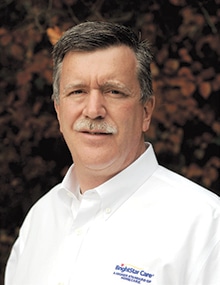
A stroke occurs when blood flow through an artery to the brain is cut off either by a blockage or because of the artery ruptures and bleeds into the brain tissue. More than 85% of strokes are because of a blockage by a blood clot or plaque.
I have a good friend who had a history of cardiac issues who was about 50. At lunch, one day as he was speaking his lunch companion began to look at him quizzically. In my friend’s mind, he was speaking clearly but it was just as clear that his friend could not understand him. He tried to write but only scribbled. He pulled out his doctor’s card and his friend called and was told to bring him to the hospital immediately. My friend, because of his history, was educated about the warning signs of stroke. He was able to get to the hospital and get the treatment he needed in the critical time window that allowed him to get his life back. Many are not so lucky. It is really important to know what the warning signs of stroke are. If it happens the quicker you get treatment the better. Some treatments are only available for a very short time after the stroke has occurred. You miss that window and those treatments are not an option.
The American Stroke Association has developed an easy to remember stroke recognition guideline. They use the acronym FAST.
F – Face Drooping – is one side of the person’s face number or is their smile uneven?
A – Arm Weakness – Is the person experiencing weakness in one arm? Ask that person to raise both arms. Does one arm drift downward?
S – Speech Difficulty – Is the person’s speech suddenly hard to understand or slurred? Speak a sentence to the person and ask them to repeat it back. Can they do it?
T – Time to call 911 – If one or more of these symptoms are present – do not wait to call 911. Write down the time so you can tell the doctor when the symptoms began.
Getting treatment within the first three hours after stroke onset is critical for minimizing permanent damage. Act F.A.S.T. Don’t wait. Dial 911.
• Much of the content of this article comes from information from the American Stroke Association www.strokeassociation.org and the www.SecondsCount.org website.
Tim Golden is the owner of BrightStar Care, Lawrenceville. You can reach Tim at (404)281-1537 or by emailing asktheseniorcareexpert@gmail.com. For more information please visit http://www.brightstarcare.com/lawrenceville/
Tim Golden
BrightStar Care
(404)281-1537
PO Box 634
Lawrenceville, GA 30046
email: asktheseniorcareexpert@gmail.com

